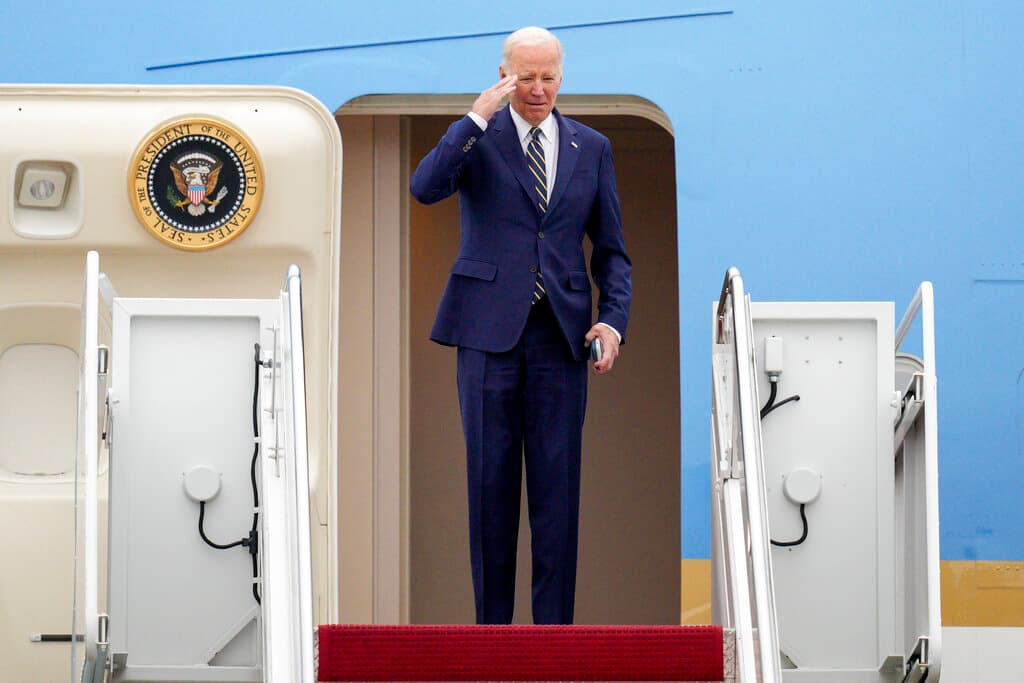Biden’s Name Likely To Be Missing on 2024 New Hampshire Primary Ballot
The ‘Live Free or Die’ state won’t bow to the Democratic Party’s demand that it give up its first-in-the-nation primary.

It might look like President Biden is running for president — but not in New Hampshire.
The party brass in the ‘Live Free or Die’ state is telling the Sun that the president’s name will not be on the ballot there because New Hampshire won’t bow to the national party’s demand that it give up its first-in-the-nation primary.
“That’s what I’ve heard,” the New Hampshire Democratic Party chairman, Raymond Buckley, tells the Sun of whether Mr. Biden will file to put his name on the ballot if the Granite State holds its primary first. “New Hampshire is gonna go first. They seem to have a false impression that there’s a question about that.”
New Hampshire has historically held its primary before any other state, and its first-in-the-nation status is enshrined in state law.
Despite that, in February, the Democratic National Committee voted to eliminate the Iowa caucus from the early window and to make South Carolina the first primary, to be held on February 3, followed by New Hampshire and Nevada three days later. Georgia and Michigan will round out the early window on February 13 and 27.
Moving South Carolina to the top spot is largely seen as payback from Mr. Biden for the role the Palmetto State played in his clinching the nomination in 2020. Mr. Biden lost the Iowa caucus and came in fifth in New Hampshire, departing the Granite State before Election Day to head to South Carolina.
There, with the help of Congressman Jim Clyburn and his mobilization of the Black vote, Mr. Biden won by a large margin. Most of Mr. Biden’s challengers subsequently dropped out of the race and endorsed him after the vote in South Carolina.
“For decades, Black voters in particular have been the backbone of the Democratic Party but have been pushed to the back of the early primary process,” Mr. Biden wrote to the DNC’s Rules & Bylaws Committee in December.
The new primary calendar follows Mr. Biden’s suggestions. New Hampshire and Iowa are 90 percent white.
The schedule will also make it easier for Mr. Biden to secure the nomination if he runs for re-election in 2024, which he has indicated he intends to do. The first lady, Jill Biden, recently dispelled rumors that Mr. Biden will not run, telling the Associated Press, “He says he’s not done. He’s not finished what he’s started.”
The DNC’s Rules & Bylaws Committee met multiple times over the past year to debate primary calendar changes, but Mr. Buckley says he was repeatedly assured throughout the process that New Hampshire’s first-in-the-nation primary would not face the chopping block.
“We certainly were assured that New Hampshire was safe,” Mr. Buckley says. “Part of what some of the Washington people dislike about the New Hampshire primary is that we do give everyone a shot and a level playing field. And we tend not to go with the establishment candidate.”
A New Hampshire congressman, Chris Pappas, a Democrat, put it more bluntly: “What happened with the DNC was a total betrayal by Joe Biden,” he said. “We are not done yet fighting, and we do have an important card to play in terms of scheduling our primary first in the nation, where it belongs.”
New Hampshire’s Republican secretary of state, David Scanlan, has confirmed that New Hampshire will be scheduling its primary first. The Republican National Committee has also committed to maintaining the traditional nominating calendar.
“We are going to continue to invite candidates to come to New Hampshire,” Mr. Pappas said. “This is a process that is bigger than any one president.”
The first intraparty Biden challenger, Marianne Williamson, an author and spiritual leader, is formally launching her campaign for the 2024 Democratic nomination Saturday at Washington, D.C. A long-shot candidate, Ms. Williams also ran for president in 2020 and has said she will travel to New Hampshire soon.
Ms. Williams’s 2020 New Hampshire campaign director, Paul Hodes, a former congressman, won’t be supporting her candidacy this time. “If Biden runs, I’m going to support Biden,” Mr. Hodes tells the Sun.
On Friday, Robert F. Kennedy Jr. is also coming to New Hampshire to speak at the Politics & Eggs breakfast at St. Anselm College, a traditional stop for presidential hopefuls. Vice President Pence, Secretary Pompeo, and a former Arkansas governor, Asa Hutchinson — Republicans considered likely 2024 contenders — have all spoken at this breakfast in recent months.
Mr. Kennedy is the son of a 1968 presidential candidate, Robert F. Kennedy, and the nephew of President John F. Kennedy, both of whom were assassinated. An environmental activist and attorney, Mr. Kennedy is best known in recent years for his opposition to vaccines. Mr. Kennedy’s anti-vaccine stance may position him well in New Hampshire among libertarians, many of whom are vocal in their opposition to Covid vaccines, but it will curry little favor with Democrats.
Mr. Kennedy has yet to say whether he is running for president, but the event was teased on Twitter by the New Hampshire Institute of Politics director, Neil Levesque, who is hosting, as “the premier stop for prospective Presidential Candidates.”
Unlike the Republicans who are not stepping aside for President Trump, potential Democratic contenders, such as the transportation secretary, Pete Buttigieg, Governor Pritzker of Illinois, Governor Whitmer of Michigan, and Senator Klobuchar, are biding their time to see if Mr. Biden throws his hat in the race. The California governor, Gavin Newsom, has promised the White House he will not challenge Mr. Biden if the president runs.
More than 60 percent of Democrats don’t want Mr. Biden to run again in 2024, according to a February AP/Norc poll. Mr. Biden would turn 86 at the end of his second term, and discussion of his age and mental decline have plagued his first term. Reports indicate that behind the scenes, Democrats are hoping Mr. Biden steps aside, as he promised he would be a one-term “bridge” president when he ran in 2020.
Mr. Biden’s low approval rating and Americans’ waning enthusiasm for another Biden term may nudge one of these higher-profile possible contenders to jump in the race. Either way, someone is going to win the New Hampshire primary, and if Mr. Biden is not on the ballot, it won’t be him.
“It will either be a prominent person to put their name on the ballot or it could end up being a truck driver from Oklahoma City that just happens to have a name that’s, you know, similar to a celebrity or something,” Mr. Buckley says. “Republicans will certainly grab ahold of that and declare whoever that person is is the — quote, unquote — front runner on the Democratic side.”
One way the Democratic Party may handle the situation is by punishing candidates who campaign in the state or put their names on the ballot, possibly by not including them in debates. The DNC may also punish New Hampshire by stripping the state of its delegates and not seating them at the convention.
“There’s a lot of barroom talk,” Mr. Buckley says, “none of that’s been specifically laid out.”
In 2008, the Democratic National Committee punished Michigan and Florida for holding their primaries early. Both states were initially stripped of their delegates and candidates pledged not to campaign there. President Obama’s name was not on the Michigan ballot.
The DNC later reversed its decision, awarding Michigan and Florida half their delegate count. Secretary Clinton won both states in tight primary races.
Michigan and Florida leapfrogging the calendar opened a crack in the door to Democratic Party discussions around the dominance of Iowa and New Hampshire in the nominating process, which culminated in the calendar shakeup this year.
“The DNC would be wise not to try to exact retribution” on New Hampshire, Mr. Hodes says. If Mr. Biden is not on the ballot, he says, Democrats will organize a “robust write-in campaign,” though that didn’t work well for Mr. Obama in Michigan in 2008.
Mr. Buckley says it’s “highly unlikely” Mr. Biden will put his name on the ballot, but he’s holding out hope. “In politics, nearly a year is a lifetime. Anything could happen,” he says.

